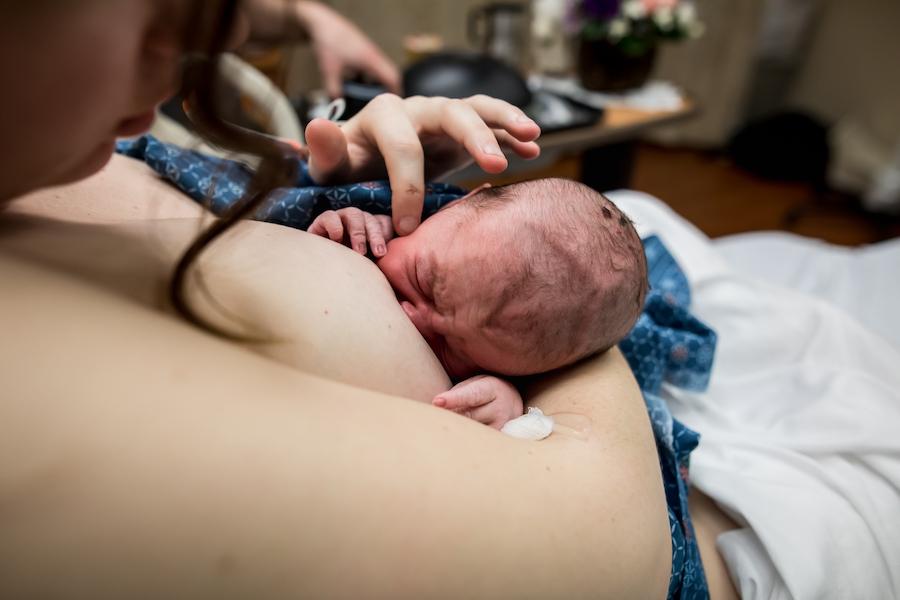When you feel that you are nursing frequently and large amounts, the first question is how old your baby is. There’s a huge difference in the advice we give the mother of a newborn and the mother of a slightly older baby. The newborn infant
The first three days when your milk comes in, baby will nurse very often. This gives baby access to the colostrum in your breasts. Colostrum is not always visible to the naked eye, but it contains everything your newborn needs, and is rich in antibodies, proteins and other good substances. A healthy baby born at term generally nurses directly after birth and might then sleep for a long period the first day. The next few days after birth, baby wants to nurse at least eight times a day, and usually more often. It is common for baby to nurse more frequently and intensely in the evening. Try to prepare during the day by resting and eating and drinking well if possible.
Recommendations
- Let your little one nurse from different breasts (switch between breasts). When baby pulls off the breast, falls asleep and wakes again, switch to the other breast. Babies can often nurse “four breasts” per feeding session. For example: Start with one breast, switch to the other and then take a break. Maybe change the diaper and then nurse again from the first breast (the third) and finish with a good-night slurp from the second breast (fourth). Imagine it as a four-course meal.
- Hold your baby skin-to-skin with his or her airways free.
- Remember that when your baby nurses, this stimulates an increase in milk supply—the more baby nurses, the more milk later. The less baby nurses, the less milk later. Imagine that baby is placing an order for milk by nursing. Many parents feel that it is difficult to know if baby is eating enough. It is seldom a matter of tummy issues when a baby wants to nurse the entire time, urinates and has bowel movements several times a day. Just nurse more, rest and drink plenty of fluids. Pay attention, see what baby does while at the breast and evaluate each feeding.
Remember
When you sit with your newborn infant at your breast nonstop, bear in mind that it will not be like this the whole time you breastfeed. Feedings will become more infrequent in time. You will find a routine that works for you both. Remember that this will last only a short period. It’s a few days/weeks now in the beginning that your baby wants to eat very frequently (keeping in mind that all babies are different) and that the more baby nurses the greater your milk supply/the more milk baby is ordering for later.
Breastfeeding and closeness
Baby wants to lie close to you and your partner—perhaps all the time. Breastfeeding is not just food, but also closeness and security. Until recently, your infant was inside of you. Baby will need a lot of closeness for a long time after birth. You can try using a sling from the beginning. This keeps baby near and your hands free.
A slightly older baby
When your baby is older and you feel like you’re breastfeeding very often, pay a bit more attention to baby’s behavior when he or she is at the breast, nursing. Is your baby sucking actively? Maybe sucking off and on, even dozing off with the nipple in his or her mouth? That’s fine. However, if you feel that your little one wakes and is hungry as soon as you move him or her from the breast, shorten the time you allow him or to sleep with the nipple in his or her mouth. Let baby nurse, but more actively, by waking baby between feeding sessions from the different breasts. You can give one to four breasts per session.
Recommendations
Wake baby by putting your finger in baby’s hand (the gripping and sucking reflex are related) and this will cause baby to start nursing again. It is perfectly normal for baby to take mini breaks. Let your baby do that and don’t move your baby too soon from the breast. Occasionally, when you move your little one from the breast, you’ll notice that baby is hungry, wakes immediately and wants to nurse more. Give baby the breast again. This mentally prepares you for the fact that the feeding session is not yet over. However, if you’re thinking that “Baby has finished eating, now I can eat something, have a shower” or whatever you’d planned to do, then it can feel more challenging to start nursing again.
Always make sure that baby is really full. After that, it’s your turn to do what you want to do.
